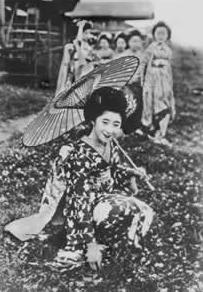Japanese Women's Rights
Friday, May 13, 2005 → by Danieru
In a country so obsessed with family, and the social status society blesses mothers and fathers with, I don't find this surprising. Further reading of the article would suggest that conservativism, in all its forms, is on the increase across the Westernised world. I mean, why concentrate on the role of women specifically? Emphasising the place of the father in a family would have equal, if not greater value to the "values of family and community"? The answer lies so deep in the Japanese psyche that many a modern Western perspective cannot uncover it. Here is an extract from my Survival entry on male and female relationships in Japan (Danjyo Kankei) to outline the history surrounding this issue:"Japan's ruling party is pursuing drastic revisions to the country's constitution, including rewording the guarantee of gender equality. Women's rights advocates say that if the revisions pass, Japan will return to "a dark period of history."
The constitution, written in 1946 after World War II, helped reshape life for women here. One of its major changes was to ensure that marriage would be solely based on agreement of husband and wife, who had equal rights. Before then women were not guaranteed civil rights or legal rights. They were not allowed to vote or own property. Although husbands could file for divorce, wives could not.
Then, in June of last year, a constitutional revision panel of the ruling party proposed adding language to Article 24 of the constitution that would emphasize the values of family and community........Mamiko Ueno, an author and professor of constitutional law at Chuo University in Tokyo, sees the revision as an attempt to foist state responsibilities onto the family, which--by and large--means women."
"Firstly, to understand how males and females are seen in Japan one must venture back into Japan's quite colourful history. In some of the more distant Eras of the past Japan was a matrilineal society. Women had the ultimate right to succeed men to the head, and therefore ownership, of the family. There were female leaders in Japan hundreds of years before the west started to recognise women as equals. By the end of the Heian period though men had exerted their dominance over society and this structure was to stay in place well up to the present day. In the closed off Edo period of Japan women were segregated to the 'inside' of society, in that socially and personally they were treated as inferior to the men (men outside - work, fight, pursue their life. women inside - house, family, pursue their husband's and son's lives). Women were even taught a more delicate form of the language, one which always assumed they were less important than the men they talked to. This idea of women on the 'inside' and the dominance of the male version of the language still have echoes in today's Japan, although the intensity is quickly decreasing."Modern Japanese women have a strength that is often hard to pin down. Is this perceived change about to be flipped on its head? Lets hope not.
The rest of the article quoted can be found below...
|
|

 Links
Links Subscribe via RSS!
Subscribe via RSS!


 Via Email
Via Email


Post a Comment